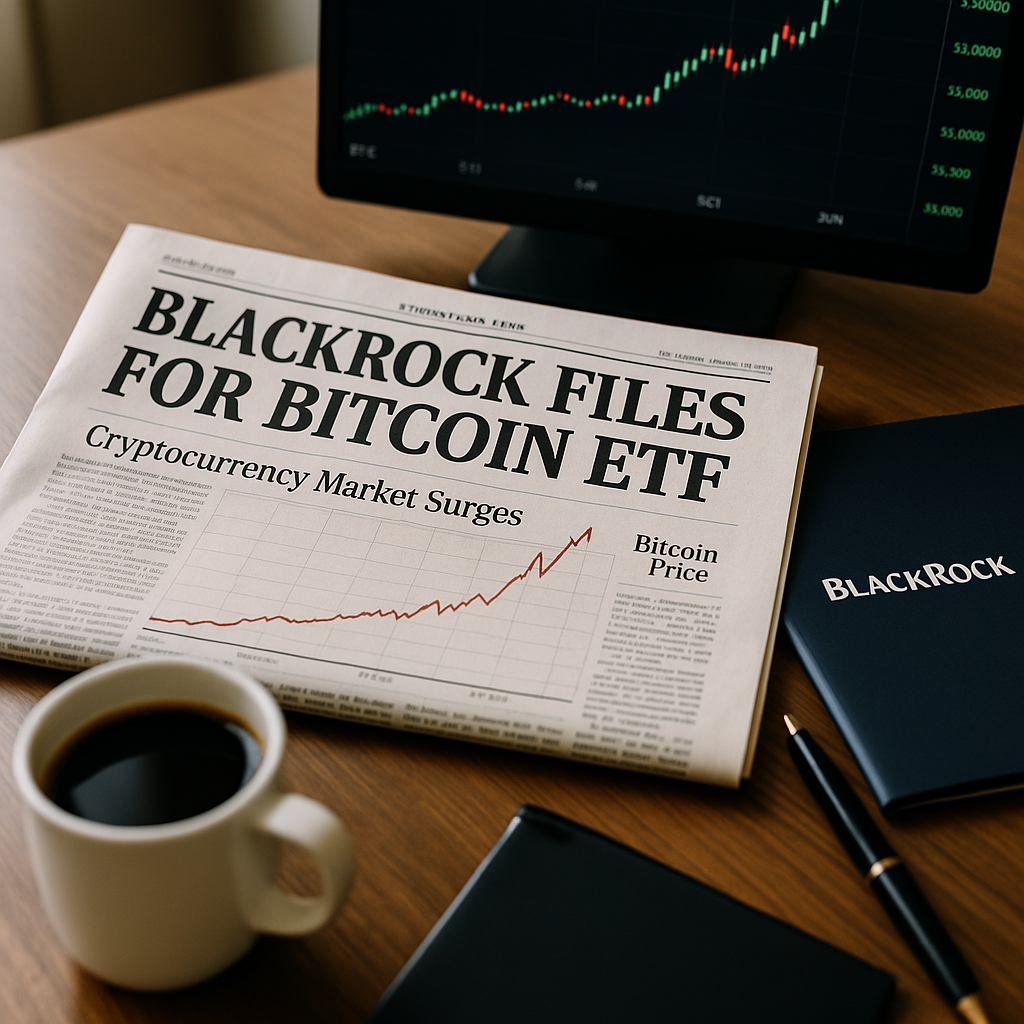BlackRock Files for Spot Bitcoin ETF: A Game-Changing Moment?
In a move that sent shockwaves through the crypto industry, BlackRock — the world’s largest asset manager — officially filed for a spot Bitcoin ETF in mid-June 2023. For many market watchers, this moment marks a potential turning point in Bitcoin’s institutional journey, representing a powerful signal that traditional finance may be finally embracing crypto at scale.
Let’s unpack why this matters, how it compares to past ETF attempts, what makes BlackRock different — and what it might mean for the future of digital assets.
What Exactly Is a Spot Bitcoin ETF?
A spot Bitcoin ETF (Exchange-Traded Fund) would allow investors to gain exposure to Bitcoin through a regulated financial product that directly holds BTC, as opposed to synthetic or futures-based versions.
This matters because:
-
It would simplify access to Bitcoin for traditional investors, especially those restricted from holding crypto directly.
-
It could significantly increase institutional inflows, bringing large capital pools from pension funds, insurance firms, and retirement accounts into the market.
-
It would reduce counterparty risk, as investors wouldn’t need to rely on crypto exchanges or custodians directly.
To date, no spot Bitcoin ETF has been approved by the U.S. Securities and Exchange Commission (SEC), despite multiple attempts from firms like Grayscale, VanEck, and Fidelity.
Why BlackRock’s Application Stands Out
BlackRock’s June 15th filing with the SEC through its iShares subsidiary isn’t just “another ETF application.” It carries weight for several reasons:
Unmatched Reputation and Regulatory Influence
BlackRock manages over $10 trillion in assets. Its ETF arm, iShares, is the largest in the world. This credibility and regulatory track record may encourage the SEC to take the proposal more seriously.
Surprise Timing
The filing came just days after the SEC sued both Binance and Coinbase, two of the biggest crypto exchanges. Amid regulatory crackdowns, many assumed institutional appetite would wane. Instead, BlackRock leaned in — suggesting long-term conviction.
Surveillance-Sharing Agreement
BlackRock’s proposal included a novel clause: a surveillance-sharing agreement with a “regulated U.S. exchange” to mitigate concerns around market manipulation — one of the SEC’s core objections in previous rejections.
This structural difference could be what finally sways regulators.
Market Reaction: Crypto Rally Resumes
The crypto market responded swiftly and positively to the news:
-
Bitcoin surged from around $25,000 to nearly $30,000 within days of the filing.
-
Ethereum and other altcoins followed, posting double-digit gains.
-
Publicly traded crypto firms like Coinbase, MicroStrategy, and Galaxy Digital saw sharp stock price increases.
-
Google search interest in “Bitcoin ETF” spiked dramatically.
In a year marred by regulatory uncertainty, the BlackRock news provided a rare jolt of optimism — and investors were quick to act.
Institutional Adoption: A Renewed Narrative
The filing has reignited discussions around institutional adoption of crypto, a narrative that gained momentum in 2020–2021 but was heavily disrupted by the failures of FTX, Terra/LUNA, and Celsius in 2022.
What BlackRock is signaling now is that institutional interest never disappeared — it was merely waiting for clarity and maturity.
If approved, a spot Bitcoin ETF from BlackRock could:
-
Open the door for mass-market investment, especially from wealth managers and retirement platforms.
-
Legitimize Bitcoin in the eyes of traditional investors.
-
Serve as a gateway for other crypto ETFs, including Ethereum and diversified digital asset funds.
What’s the SEC Likely to Do?
The SEC has long been hesitant to approve spot Bitcoin ETFs, citing concerns over:
-
Market manipulation
-
Lack of transparent pricing
-
Insufficient surveillance mechanisms
But BlackRock’s proposal addresses these directly, and with political pressure mounting to bring crypto under structured regulation, some analysts believe approval could happen before the end of 2023 — or at least pave the way for future filings.
There’s also a pending lawsuit between Grayscale and the SEC, in which Grayscale is appealing the SEC’s denial of its attempt to convert its Bitcoin Trust (GBTC) into a spot ETF. A legal victory for Grayscale could further tilt the scales toward eventual approval.
How Should Investors Interpret This?
June 2023 has proven to be a pivotal moment for crypto. For investors, the implications are significant:
Short-Term Momentum
The mere filing by BlackRock has already sparked a rally. Traders may ride the wave, but should stay cautious of volatility — especially if the SEC delays or rejects the filing.
Long-Term Confidence Signal
The fact that BlackRock is entering the fray — in the middle of a regulatory storm — should not be overlooked. It’s a strong signal that the biggest players believe crypto is here to stay.
Broader ETF Trends
BlackRock’s move could trigger a domino effect, with other firms refiling or updating previous proposals. We may see a wave of ETF-related news over the second half of 2023.
Risks to Watch
Despite the excitement, there are risks:
-
Approval is not guaranteed. The SEC may delay or ask for amendments.
-
Political pressure could influence the decision, especially with ongoing regulatory enforcement.
-
Crypto volatility could undermine confidence if another major scandal emerges during the review process.
That said, the filing alone has already achieved something important: restoring positive momentum to a sector that has faced relentless skepticism over the past 12 months.
Final Thoughts: Why This Moment Matters
BlackRock’s move to file for a spot Bitcoin ETF in June 2023 is more than just an application — it’s a vote of confidence in crypto’s long-term future, coming from the most powerful institution in asset management.
While approval may still be months away (if ever), the psychological and market impact is already being felt. For an industry that has spent most of 2023 under regulatory pressure and public doubt, this could mark the beginning of a new chapter — one where Wall Street no longer watches crypto from the sidelines, but begins to take part.
